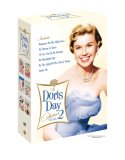| Reviews & Columns |
|
Reviews DVD TV on DVD Blu-ray 4K UHD International DVDs In Theaters Reviews by Studio Video Games Features Collector Series DVDs Easter Egg Database Interviews DVD Talk Radio Feature Articles Columns Anime Talk DVD Savant Horror DVDs The M.O.D. Squad Art House HD Talk Silent DVD
|
DVD Talk Forum |
|
|
| Resources |
|
DVD Price Search Customer Service #'s RCE Info Links |
|
Columns
|
|
|
Doris Day Collection, Vol. 2, The
I sometimes like girl who is not actress. Is less pretend and more heart.
Director Michael Curtiz
Warner Bros. new six-disc The Doris Day Collection: Volume 2 goes back to the very beginning of Day's film career, including her first two starring appearances, making it essential viewing for fans of Miss Day who wish to see the evolution of one of the most important, influential film actors of the 20th century.
Actually, it's not much of an evolution. By all accounts, including her own, Doris Day was that rare movie star who proved to be a "natural" before the camera. With absolutely no previous training in acting, Day was able to go right from being a lesser but popular radio and recording personality, onto the soundstages of Warner Bros. studios and perform (for the legendary, sometimes intimidating Michael Curtiz) as if she had been doing it all her life. Watching the fluffy, bouncy Romance on the High Seas, her first film, and more tellingly, My Dream is Yours, her second starring role, it's startling how receptive and open Day is to the difficult process of film acting. She is indeed that rare "natural" actor, and a few dramatic scenes in My Dream is Yours (as well as the one true dramatic piece in this collection, I'll See You in My Dreams) play as well as any she gave in her later, more celebrated titles such as Love Me or Leave Me and The Man Who Knew Too Much.
Of course, it isn't just dramatics that makes a talented film performer; ask any successful serious actor, and they'll attest to the fact that being light on camera, being comedic and open and sunny, is just as difficult, if not harder, than pulling off a particularly weighty dramatic scene. And certainly, The Doris Day Collection: Volume 2 shows Day at her early, light-hearted best. Included in this nicely designed DVD box set (which sports a goodly amount of fun extras and bonuses) are two of Day's perhaps best-loved early musicals, On Moonlight Bay and By the Light of the Silvery Moon, where Day rocketed to the top of movie exhibitors' and film fans' popularity polls with performances that set in cement her incredibly fresh, all-American musical appeal, as well as Lucky Me, a rather anonymous big-budget musical made in CinemaScope that, despite all her efforts, failed to click with the critics and public.
ROMANCE ON THE HIGH SEAS
In 1948, as the well-documented story goes, including Day's own autobiography, Day was all set to leave Hollywood after her marriage failed. A lackadaisical approach to expanding her second-tier celebrity as a radio and big-band singer, had gone nowhere, as well. Just days before leaving California for good, Day was badgered by her agent into attending a party at famed composer Jule Styne's house in Beverly Hills. Asked to sing for the famous crowd but refusing, Day was eventually led up to the piano by Styne's lyricist partner Sammy Cahn, where she sang Embraceable You. So taken were Cahn and Styne with Day's emotive performance, that by the end of the night, Day had secured a screen test to star in their latest Warner Bros. musical, Romance on the High Seas, a part originally offered first to Judy Garland, and then Betty Hutton, who had to back out of the deal due to an unexpected pregnancy. 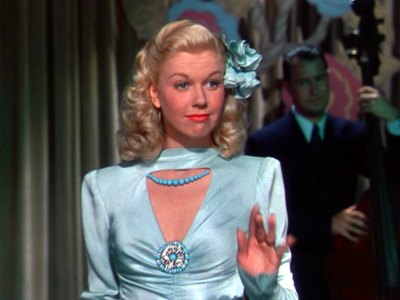
Day, never having acted before, was auditioned by no less than Hollywood legend Michael Curtiz himself. Having broken down several times during a singing tryout, Curtiz immediately sensed great emotional weight in Day's performance, and secured a proper screen test for her later that week. After the test was viewed, Day was immediately signed to a seven year contract with Warner Bros., and as the cliche goes, a film star was born overnight.
In Romance on the High Seas, Day is fourth billed as Georgia Garrett, a gum-snappin' honky tonk singer who, despite little money, longs to travel to far away places. Entering a local travel agency, where she often, to the exasperation of the employees there, plans elaborate trips she doesn't pay for, Georgia meets Elvira Kent (Janis Paige), a wealthy married woman who's finally, after several years of postponement, pinned down her busy businessman husband Michael Kent (Don Defore) to take their honeymoon cruise. The Kents enjoy a comically suspicious marriage where both are convinced that the other is cheating, a theory constantly debunked by her Uncle Lazlo (S. Z. Sakall).
After Michael cancels their cruise again, Elvira is convinced that he's staying behind to cheat on her with his sexy new secretary. When Georgia and Elvira's passport photos are switched in the mail, Elvira has the brilliant idea of sending Georgia in her place on the cruise, having her pretend to be Elvira Kent, while she stays in New York and spies on her husband Michael. Georgia will send pre-addressed letters to Michael from various ports of call, convincing him that Elvira is indeed on the ship, and thus luring him into a false sense of security. But Elvira doesn't count on Michael's paranoia; when he finds out that Elvira intends to go on the cruise alone, he's convinced she's cheating on him, and hires private detective Peter Virgil (Jack Carson), to go on the cruise and keep an eye on her. Further compromising the plan is the sudden appearance on board of Georgia's piano-playing friend Oscar (Oscar Levant) who doesn't know of Georgia's subterfuge. Naturally, as the cruise progresses, Peter and Georgia-as-Elvira fall in love, creating numerous comedic complications for the two couples.
Romance on the High Seas is fluff to be sure, with an arbitrary silliness that comes from the sheer driving force of the mechanics of the plot, along with a snappy, sure-footed script, courtesy of celebrated twin screenwriters Julius and Philip Epstein, and Billy Wilder's writing partner I. A. L. Diamond, and a terrific supporting comedic cast, including old pros Franklin Pangborn, John Berkes, and Fortunio Bonanova. Sure, there's a flabby middle section, along with some questionable musical moments (Carson's Run, Run, Run number is painful), but it's an undeniably pleasant little farce, particularly when Day gets a chance to sing. Obviously, the studio tried to shoehorn Day into the Betty Hutton style of mugging and belting out a number, which Day does quite well in the I'm in Love number. Perhaps most startling for Day's fans is her slightly harder-edged, chippie personality here; it's not something we're usually accustomed to in her later, more innocent roles. Here, the studio let Day show off her sexy dancer's body to good effect, and she's much more flip and smart-alecky with her lines than we're used to hearing from her. As well, the script makes it clear that were it not for the deal she made with Elvira, she'd be more than willing to return with Carson to his stateroom several times throughout the film. It's actually a refreshing glimpse at Day, and perhaps a side of her that was sublimated due to the success of her all-American, girl-next-door appeal. It's well known that she often chaffed at the so-called "virginal," wholesome label applied to her later film appearances, so it's nice to see Day act a little more naughty here.
The real appeal, though, in Romance on the High Seas is when Day gets to stop and sing directly to the audience such standards as It's Magic and It's You or No One. Real care has been taken by director Curtiz and choreographer Busby Berkeley to showcase Day for optimal impact, and she scores a bullseye every time. It's not hard to see that audiences were wowed when that Technicolor camera came in close to Day's dewy face to capture her plaintively singing It's Magic. Almost sixty years (!) later, she still has a visceral effect when emoting such a song for the camera. Doris Day may have been fourth billed on this bouncy little musical comedy, but clearly the director and screenwriters knew who was going to be the real, lasting star.
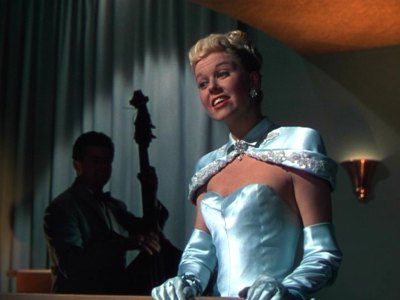
The DVD:
The Video:
Romance on the High Seas looks spectacular in a perfectly aligned Technicolor print. The full-frame riot of colors is sharp and focused, and looks as if it was shot yesterday.
The Audio:
The Dolby Digital English mono soundtrack accurately reflects the original theatrical presentation. It's very clear.
The Extras:
Included on this disc is the short subject Let's Sing a Song from the Movies, a 1948 sing-along featurette from the popular Warner Bros. Memories from Memory Lane series, featuring The Melody Makers. Produced by Gordon Hollingshead, written and directed by Jack Scholl, and narrated by Art Gilmore, these little sing-along short subjects were very popular with movie audiences who hadn't yet learned to be so self-conscious about such things. Clips from other Warner films, that segue into the sing-alongs include: Ethel Waters singing Am I Blue; By a Waterfall, from Footlight Parade; Alexis Smith, from San Antonio, singing Some Sunday Morning, and Jack Carson and Dennis Morgan singing A Gal in Calico from The Time, The Place, and The Girl. A cartoon short is included; the 1947 Looney Tunes I Taw a Putty Tat, starring Sylvester and Tweety. Romance on the High Seas's theatrical trailer is included, as well.
Final Thoughts:
Breezy, light, inconsequential, and fun, Romance on the High Seas main claim to fame is the introduction of Doris Day to movie fans. She proved to be a natural comedian, with a heartbreaking ability to connect directly with the audience when singing a torch song. The cruise gets a little bumpy in the middle, but it's worth it just to hear Doris sing It's Magic. I recommend Romance on the High Seas.
MY DREAM IS YOURS
Hoping to capitalize on what he was seeing in the rushes for Romance on the High Seas, Michael Curtiz began pre-production on My Dream is Yours before Romance on the High Seas even wrapped. Day, now second-billed to Jack Carson, would get a few chances amid all the songs to show her acting chops in scenes reminiscent of her own private life.
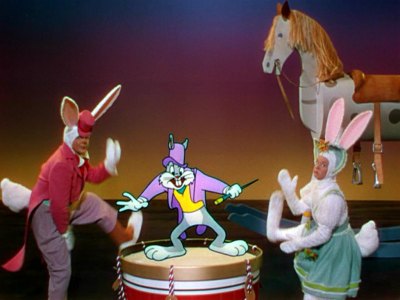
Carson plays Doug Blake, a hustling go-getter of an agent (the kind of role Carson played very well) who's finally had it with his pompous, arrogant radio singing star client Gary Mitchell (Lee Bowman). After a falling out, where Mitchell essentially tells Blake he's useless to him now that he's a big star, Blake, with the help of gal pal Vivian Martin (Eve Arden) decides to go out and create a new star, one who will take over the Hour of Enchantment radio program that Mitchell now currently hosts, and which is sponsored by eccentric businessman Felix Hofer (S. Z. Sakall). Having no luck, Blake wanders into a bar, and spills the beans to the bartender (Edgar Kennedy) that he's looking for a new, fresh talent to promote. Charlie, the bartender, immediately calls his niece, Martha Gibson (Doris Day), a record player for a piped-in jukebox company, to skip the record and to sing directly into the live-feed to the bar. There, Blake hears her voice, and is tipped off to where Martha works - or at least, where she did work: she's fired for singing yet again, instead of just playing the records for the clients.
Once she's convinced by her Uncle Charlie and Blake that she has a future in singing, she agrees to go on tour with Blake, promoting her career. But complications arise when she insists on bringing her small son, Freddie (Duncan Richardson), along on the road. After Uncle Charlie insists that she leave the small boy with him, Martha and Doug hit the road -- with little success. Eventually, Doug gets Martha a shot at auditioning for Felix Hofer's show, but his old-fashioned sensibilities don't appreciate Martha's hepped-up jive singing, and she's rejected. But not by smooth heel Gary Mitchell, who watched her perform. Soon, Martha's in love with Gary, and once Doug figures out that Martha's singing style should be changed from mugging belter to soft, sweet balladeer, Martha becomes a big hit. Predictably, just as Martha is on the rise, Gary's career plummets, and he disappears. Doug proposes to Martha, but she just can't get Gary out of her mind, until Gary returns to the big time - courtesy of Doug's intervention.
Although My Dream is Yours may play at times like a road company version of A Star is Born, it's a big improvement over Romance on the High Seas, particularly because Day really gets a chance to act here. Playing a mother who must leave a child with relatives while she pursues a better life for him and herself (a situation mirrored in Day's own life at the time), Day is quite impressive in her scenes with her little son, so well played by Duncan Richardson (who's unfortunately not billed on the screen). When Day must cry at the airport, prior to leaving her son, there's a depth of emotion that comes across, as with most of Day's later dramatic roles, that feels honest and real. As many directors commented on Day after working with her, when she had a scene such as this one to play, it wasn't acting for her. It was reality.
Long-time vet Harry Kurnitz turns in a fast-moving, agreeable script, with some unexpected, hard edges to it. Martha's husband was lost in the war (a similar painful, fresh memory for many in the audience at the time), and the notion that Martha must essentially abandon her child (to her Uncle Charlie) to carve out a hard-won career, is played straight, without any apologies, but also without any sugar-coating to Day's guilt about the situation. Bowman's heel singing star isn't given any breaks in the film, either, with the producers playing it realistically when his character undergoes no sudden conversion at the film's end. He's a rat, and he stays a rat. Director Michael Curtiz again shows an intuitive understanding of where Day's talents lie. Certainly animation fans will want to look out for the fantasy sequence Freddy Get Ready, where Curtiz has director Friz Freleng insert Bugs Bunny into a dream sequence with Richardson, Day and Carson. It's a cute, and nicely bizarre departure in the film, and the obvious time and expense that was needed to execute it indicated how strongly Warner Bros. felt about Day even after only one prior film. Day's supporting cast is strong, with Carson quite good as the hustling agent. Carson, who may have been a better supporting actor than a lead, meshes nicely with Day (they were dating at the time, and Day credits him with giving her many pointers on film acting), as well as with the always dependable Eve Arden, who can throw out a wisecrack with the very best. Sheldon Leonard pops up with another memorable tough-guy performance, but Adolphe Menjou is wasted in a barely visible role. And "Cuddles" Sakall is fun (and annoying) again, doing his patented shtick. My Dream is Yours was a big hit for Day, and solidified her place as a real comer among the other Hollywood box office stars.
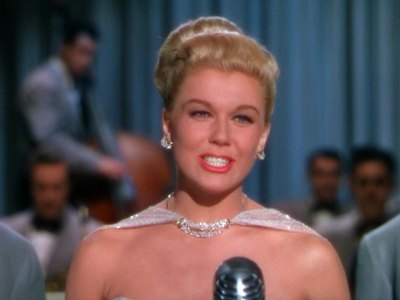
The DVD:
The Video:
My Dream is Yours doesn't look quite as good as Romance on the High Seas did, with a sometimes grainy, soft, even pink image, with the Technicolor registration off at times, as well. Still, many sequences do look marvelous, and overall, the full-frame video image for My Dream is Yours is much better than you've ever seen it on video or TV.
The Audio:
The Dolby Digital English mono soundtrack accurately reflects the original theatrical presentation. It's strong and clear enough to get Day's songs out nicely.
The Extras:
Included on this disc is the short subject So You Want to Be an Actor, a 1949 Joe McDoakes featurette starring George O'Hanlon. Produced by Gordon Hollingshead, written and directed by Richard Bare, these funny Joe McDoake comedy shorts still play well today. Next, the 1950 short subject The Grass is Always Greener, starring Chill Wills and based on the one-act play Summer Comes to the Diamond-O is included - a curious choice, because I can't connect up this western tale with My Dream is Yours (if I'm missing something, by all means, please email me). A 1948 Merrie Melodies, A Ham in a Role, starring The Goofy Gophers (very funny) is included, as well as the theatrical trailer for My Dream is Yours.
Final Thoughts:
A smooth, self-assured musical with a hard-edged undercurrent, My Dream is Yours confirms the faith that director Michael Curtiz had in discovering Doris Day's acting talent. She emerges from only her second film with a firm command of the medium, already able to play comedy, drama, and musical numbers with natural aplomb. A big improvement over the already entertaining Romance on the High Seas, My Dream is Yours is recommended.
I'LL SEE YOU IN MY DREAMS
By 1951, Doris Day had established herself not only as America's favorite musical singing star, but also as one of the most popular light comedians on the screen. A foray into straight dramatics, 1949's Young Man with a Horn was well-received, so Warner Bros. must have imagined that Doris would be perfect to accompany Danny Thomas in the biopic I'll See You in My Dreams, the fictionalized account of legendary songwriter Gus Kahn.
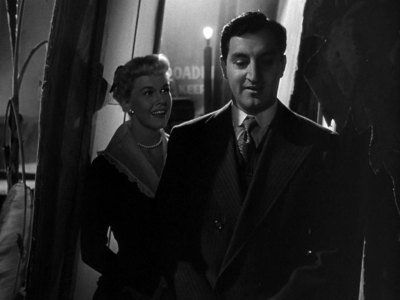
I'll See You in My Dreams details the sometimes rocky personal and professional life of songwriter Gus Kahn, the remarkable composer of such memorable additions to the Great American Songbook as Dream a Little Dream of Me, Makin' Whoopee, Love Me or Leave Me, Side by Side, Yes, Sir, That's My Baby, It Had to Be You, I'll See You in My Dreams, Caroline in the Morning, and Ain't We Got Fun?. According to this script by Melville Shavelson and Jack Rose, Kahn (Danny Thomas) was a small-time crockery salesman who wrote a copious amount of songs in his spare time. Determined to break into the famous Tin Pan Alley, Kahn catches the eye of sympathetic music publisher employee Grace LeBoy (Doris Day). Despite doubt and uncertainty on his part, Kahn is convinced by LeBoy that he has a hit on his hands, and she pushes him to plug it once it's published by Fred Thompson (James Gleason).
Having a major hit on his hands (a hit song back then was mostly measured by the sale of sheet music), Kahn repeats a cycle of success, followed by setbacks, followed by prideful rejections of help, followed by Grace essentially bailing him out of trouble, and putting him back on top, followed by Gus resenting her for it, played again and again in the film (a depiction of Kahn that his son later said was inaccurate). Chief among the conflicts Kahn encounters in I'll See You in My Dreams are an eight year courtship where Kahn refused to ask Grace to marry him, his anger at realizing that Grace has constantly supported him and kept his career going, an almost-extramarital dalliance that threatens their marriage, and his sometimes fractious relationship with lyricists Walter Donaldson (Frank Lovejoy) and Egbert Van Alstyne (Dick Simmons).
A routine Hollywood biopic through and through, I'll See You in My Dreams has some defenders who see it as a classic example of the musical biography that Hollywood used to excel at during the 1940s and 1950s. I can't agree. Although Doris Day is top-billed here, screen time is mostly taken up by Danny Thomas, in an annoying, grumpy and cloying performance that leaves the audience little to root for in watching Kahn work out his personal problems. Never a fan of Thomas, I frankly can't see the appeal of his Gus Kahn role here, where the majority of his performance is spent acting like a heel towards his supportive wife. The real man who wrote those marvelously evocative, lively, emotionally true songs had to be more interesting than the grumpy schnook portrayed here. I doubt few women in the audience liked seeing Thomas constantly berate Day for helping him have a marvelous career, only to see Day keep coming back for more and more neglect and emotional abuse. In the film, Thomas walks out on Day, leaving her and their children behind, but once they're reconciled at the end, the children are there, ringside, smiling and clapping along at their father's testimonial dinner. Aren't there any repercussions for his actions in this film? Not according to the scriptwriters, who give the abusive Kahn pass after pass for his moody, unattractive behavior. As for his writing partners, why in the world would anyone bother to help this ingrate? The movie seems to assume that his talent is enough to blind everyone to his childish behavior, but the movie never convinces us that he is worth it, and a lot of that failure lands at the feet of Thomas, who exudes zero star charisma - or even a personality - here. A polished actor who could be a heel while still eliciting sympathy from the audience -- somebody like a Kirk Douglas or a Richard Widmark - might have saved some respectability for the character, but Thomas is hopelessly stolid, dull, and downbeat.
The marvelous songs are a saving grace here, but unfortunately, Day sings very few of them, and even then, it's just snippets; the film performs 23 of his songs, but few are sung all the way through, creating a "greatest hits medley" feel that's all the more frustrating just when we're getting into a particular song. It's a shame that Day isn't seen more here, and that when she is, she's clearly been put in the subordinate position to the Kahn character. Modern viewers may be uncomfortable in a production number where Day performs in blackface, but Warner Bros. is to be commended for not excising the scene from this DVD. The only other bright spot in I'll See You in My Dreams is a small supporting role by Patrice Wymore as singer Gloria Knight, a supposed rival for Kahn's affections. A up-and-comer at Warners when I'll See You in My Dreams was lensing, Wymore is quite effective - as well as sexy as hell - as the "other woman," and when she flashes those long legs in a nice production number, you wind up wishing the film had been about her, and not the dreary Gus Kahn.
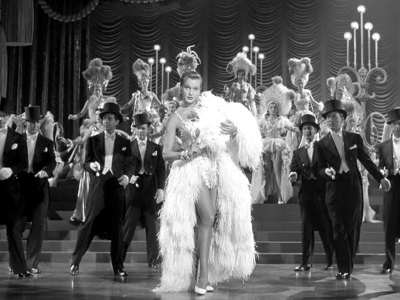
The DVD:
The Video:
The full screen black and white video image for I'll See You in My Dreams is crisp and clean, with little if any anomalies like dirt or scratches.
The Audio:
The Dolby Digital English mono soundtrack accurately reflects the original theatrical presentation.
The Extras:
Included on this disc is the short subject The Screen Director, a 1951 featurette starring Ruth Roman and Gordon MacRae, and featuring glimpses at directors as diverse as Roy Del Ruth, John Ford, John Huston, and Frank Capra. Produced by Gordon Hollingshead, written and directed by Richard Bare, it's a fascinating, if idealized, look at the Hollywood directing process. A 1950 Merrie Melodies, Lovelorn Foghorn, starring Foghorn Leghorn (still hilarious after all these years) is included, as well as the theatrical trailer for I'll See You in My Dreams.
Final Thoughts:
Clearly The Doris Day Collection: Volume 2 weakest entry, I'll See You in My Dreams unfortunately subordinates Day for grumpy Danny Thomas, and produces another phony Hollywood biopic that celebrates a dour, abusive artist -- and then asks everyone, including the audience, to love him for it. You'll watch it because it's included in the set, but compared to the other titles here, I'll See You in My Dreams is a big miss.
ON MOONLIGHT BAY
Certainly one of Day's best-loved, most successful early nostalgia musicals, On Moonlight Bay was adapted from the Booth Tarkington Penrod stories, the lightly satirical, affectionately fictionalized and romanticized accounts of his youth in rural Indiana. Creating the "perfect" idealized mid-Western family during the innocent years prior to America's involvement in World War I, nervous Cold War audiences flocked to On Moonlight Bay to see well-scrubbed, clean-cut Doris Day and handsome Irish lunk Gordon MacRae fall in love under the watchful eye of her adoring, tolerant family.
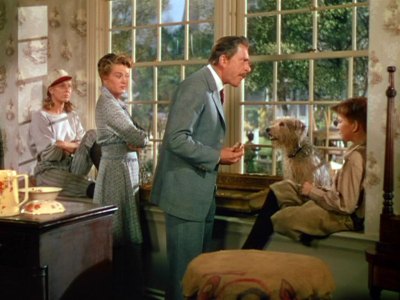
Day plays Marjorie Winfield, the tomboy teenaged daughter of bank vice president George Winfield (Leon Ames) and mother Alice (Rosemary DeCamp). Her younger brother, Wesley (Billy Gray), is a holy terror who causes no end of grief for his parents, Marjorie and the family maid Stella (Mary Wickes). Recently moved into a bigger house, in a nicer part of town, George hopes that this more upscale neighborhood will have a positive effect on Marjorie, by encouraging her to let go of her boyish pursuits of baseball and auto mechanics, and to settle down and become a "real lady," with a suitable suitor. Meanwhile, Wesley makes friends with neighbor Jim Sherman (Jeffrey Stevens), who promises to show Wesley the family firearm. Going off into the garage, the boys are stopped by Marjorie from firing off the large revolver, but in the process, she blows a hole in the garage door, and almost hits Jim's brother Bill Sherman (Gordon MacRae). When Bill breaks into the garage, and goes to spank the rowdy boy who fired the shot, his first blow reveals he's spanking something much different than what he expected, and thus, true love is born.
However, courting between the two becomes difficult, particularly when Bill, who's a young college radical (he thinks bankers are "parasites"), clashes with Marjorie's father. When Bill returns to college, Marjorie agrees to wait for him, but still dates (platonically) Hubert Wakely (Jack Smith), a nebbish bank clerk officially approved by George as a suitable husband for Marjorie. Crisis comes to the young couple when Bill, who disapproves of marriage, enlists in the Army when he graduates from college. Marjorie, rejecting her parents strict moralism, decides to follow Bill wherever he's stationed, but Bill suddenly decides to propose marriage. Naturally, the family is confused, but everything is worked out before the happy fade-out.
Existing as a whole, complete evocation of a mid-western town that existed only in fantasy, it's not surprising that On Moonlight Bay was such a popular film in 1951. As the Cold War heated up, and the anxieties of the Second World War were transformed into the terrors of the nuclear age, it must have been a tremendous comfort to see the shining, happy faces of Day and MacRae as they fought and loved in a mythical, safe pre-WWI Indiana small town. The script, written by Jack Rose and Melville Shavelson, is a surprisingly spry and smart one, with plenty of clever lines and situations that belie the potentially prudish tone of the film's period setting. When Marjorie wears her first-ever party dress for her first date with Bill, her mother offers to help stuff her bra with powder puffs, which create an hilarious sight gag later in the evening (when MacRae holds her close, a huge puff of talc powder blows out of the top of her dress). As well, despite what some critics see as Day's propensity to play virginal, innocent characters, Marjorie, at the end of the movie, is quite willing to become what was then known as a "camp follower," forgoing the ritual of marriage that she thinks Bill doesn't want, to be with him in every way.
On Moonlight Bay is filled with scenes that are designed to trigger a nostalgic glow in the viewers who crowded theaters in 1951: family Sunday dinners, the county fair, dances at the lakeside pavilions, and snowball fights in the town square. It's an easy, tempoed film, with an assurance to the pacing that surely comes from veteran pro director Roy Del Ruth. Ruth knows how to stage a good scene; when MacRae gives Day her first kiss, the camera pans down as Day's hand brushes away her baseball cap and ball, signifying her abandonment of her tomboy ways. It's such a simple, obvious shot, but it speaks volumes to the skill of the average Hollywood studio director who lived their craft day in and day out, for decades.
Day and MacRae are a magical pairing. Day, literally bursting with vitality on the screen (she's so damn healthy-looking here!) looks almost like a poster for the wholesome, fresh all-American girl-next-door that was the ideal of millions of young men in 1951 America. Her singing is pure and unadulterated, and her thesping has noticeably become more matured and skilled. MacRae, handsome and energetic, strikes just the right note of contrariness that attracts Day, as well as the leading man qualities and smooth singing style that's required of the role. Enough can't be said about the supporting actors in the Winfield household. Billy Gray, nicely effective as the boy's boy Wesley, provides a lot of the comedy relief in On Moonlight Bay (his wheezing bit is quite humorous), as does Mary Wickes as the waspish, nosey housekeeper Stella. Worthy of a film of their own, pros Leon Ames and Rosemary DeCamp are the perfect loving father and mother, with excellent chemistry together. The songs, including the title theme, are lovingly recreated and smoothly delivered by Day at the peak of her singing powers.
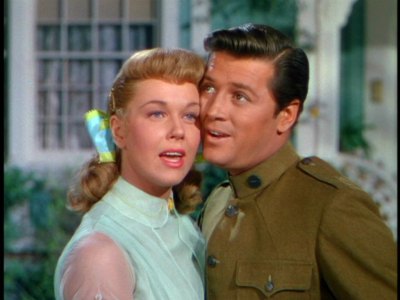
The DVD:
The Video:
I was a little disappointed in the full screen video image of On Moonlight Bay. At times, it's a soft image, with the Technicolor registration going awry (at one point, the whites of Wesley's eyes shimmer blue). Still, it's a decent enough print, and it looks better than the TV viewings you're probably used to.
The Audio:
The Dolby Digital English mono soundtrack accurately reflects the original theatrical presentation. It's strong and clear enough to get Day's songs out nicely.
The Extras:
Included on this disc is the short subject Let's Sing a Song from the Moonlight, a 1947 sing-along featurette from the popular Warner Bros. Memories from Memory Lane series, featuring The Melody Makers. Produced by Gordon Hollingshead, written and directed by Jack Scholl, and narrated by Art Gilmore, these little sing-along short subjects were very popular with movie audiences who hadn't yet learned to be so self-conscious about such things. Songs include: By the Light of the Silvery Moon, On Moonlight Bay, In the Moonlight, and Shine On Harvest Moon. A cartoon short is included; the 1950 Merrie Melodies A Hound for Trouble, as well as On Moonlight Bay's theatrical trailer.
Final Thoughts:
For pure, unadulterated fantasy nostalgia, On Moonlight Bay is about as perfect a musical vehicle as you can find. Doris Day and Gordon MacRea are an inspired teaming, and the smart, witty script makes sure to wink at you now and then, and let you in on the joke. I highly recommend On Moonlight Bay.
BY THE LIGHT OF THE SILVERY MOON
With the phenomenal success of On Moonlight Bay, Warner Bros., not being able to re-release the film for a few years, did the next best thing: they remade it. 1953's By the Light of the Silvery Moon may be a sequel in name, but it essentially covers the exact same dramatic ground of On Moonlight Bay, even going so far as to revert the Marjorie character back into a tomboy, and have the young couple disagree about marriage all over again. Utilizing the same characters, By the Light of the Silvery Moon tries to start all over again with the same story, and as such, suffers in comparison to On Moonlight Bay. It's still entertaining, but it doesn't feel complete like On Moonlight Bay.
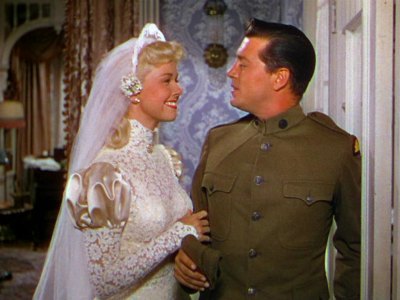
With the war over over there, Bill Sherman (Gordon MacRae) is coming back home. His intended bride, Marjorie Winfield (Doris Day), has somehow returned to her tomboy ways, working underneath her father's old jalopy while she waits for word from Bill. Her parents, Alice and George Winfield (Rosemary DeCamp and Leon Ames) wait patiently as well for Marjorie to become a grown woman and fulfill her ultimate destiny: to get married and have a family. But when Bill returns home, and informs Marjorie that he wants to wait until he's more settled before he's married, the sparks fly. George gets Bill a job at the bank, and Marjorie waits for the right time when Bill will be ready to tie the knot.
Meanwhile, Wesley (Billy Gray), obsessed with Sherlock Holmes, is looking for clues in all the wrong places. It's not enough that he steals his father's boss' Thanksgiving turkey (to save their own which has become Wesley's pet), but now he's become involved with Marjorie and Stella's (Mary Wickes) foolish notion that George is having an affair with a French actress. Since the bank owns the town's opera house, it's up to George to make sure the play that's coming to town is a moral one. Meeting sexy French actress Miss LaRue (Maria Palmer), George copies down a questionable passage from the play to take to his boss for final approval. Unfortunately, the letter comes into Marjorie's hands, and she construes it to mean that her father is in love with Miss LaRue. Asking Wesley to burn it, Bill finds the letter first, and construes that Marjorie is having the affair. Will everything be worked out at frozen Miller's Pond, where the family gathers to skate?
If you had never seen On Moonlight Bay, you wouldn't think twice about By the Light of the Silvery Moon. It's innocuous, pleasant, and not particularly memorable, except for some nice production numbers with Miss Day. But by comparison, it suffers next to On Moonlight Bay. With an awkward start to the story, where Stella directly addresses the audience, telling us what exactly is going on, By the Light of the Silvery Moon already falls behind the assured professionalism of On Moonlight Bay. The rest of the film is the same way; individual scenes have charm and an unmistakable polish, but as a whole, they don't mesh. The reason for the film is merely to recreate the experience the viewer had when watching On Moonlight Bay, and not to present a wholly individual experience that the prior film achieved. By the Light of the Silvery Moon is lesser by design. Grafting on another suitor-for-Marjorie subplot doesn't keep By the Light of the Silvery Moon fresh, nor does the all-too-familiar mistaken infidelity plot. Particularly annoying is the build-up that's given to the whole Miss LaRue play -- which the producers then fail to show us! The movie, filmed entirely on the Warner Bros. soundstages, doesn't even benefit from the odd backlot shot or two that opened up On Moonlight Bay; By the Light of the Silvery Moon feels closed off and claustrophobic in comparison. But as any old Hollywood pro will tell you, if you send the audience out happy during the last ten minutes of a movie, you've got a success on your hands. And undoubtably, the Miller's Pond skating scene is expertly designed and executed. The sight of Day and MacRae singing the title song almost makes up for the relative banality of the rest of the film -- almost.
Day as well doesn't seem too comfortable here, which is surprising considering how manic she appears throughout the early scenes. Reverting to uncharacteristic mugging, the earlier sweet, innocent, yet tomboyish Marjorie of On Moonlight Bay has now been replaced by a Hollywood star who's all too aware that the focus is strictly on her. It's not that Day is offensive in the role, like some Hollywood diva; quite the opposite. She's so determined to be "fresh" and "carefree" and "bright," that she tilts her performance uncomfortably into broadness. MacRae, who has less to do here than he did in the first film, doesn't look especially thrilled to be here, either. DeCamp and Ames are fine, but they merely serve as backdrops in By the Light of the Silvery Moon; they don't feel too integral to the plot. And that's a shame, because most of the delight that came from the first film emanated from that family feeling so carefully crafted in On Moonlight Bay. Whereas that film felt genuine and alive within its fantasy studio recreation, By the Light of the Silvery Moon feels mechanical and rote.
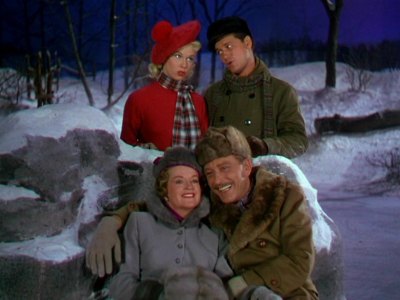
The DVD:
The Video:
Again, as with On Moonlight Bay, the Technicolor registration for By the Light of the Silvery Moon wavers, giving a shimmer of color at times that affects the clarity of the image. Still, the full frame image looks fairly good here.
The Audio:
The Dolby Digital English mono soundtrack accurately reflects the original theatrical presentation. It's very clear.
The Extras:
Included on this disc is the short subject So You Want to Learn to Dance, a 1953 Joe McDoakes featurette starring George O'Hanlon. Produced by Gordon Hollingshead, written and directed by Richard Bare, these funny Joe McDoake comedy shorts still play well today. Next, we have another George O'Hanlon Joe McDoakes featurette called So You Want a Television Set. A 1953 Merrie Melodies classic, From A to z-Z-Z-Z, featuring the daydreaming schoolboy Ralph Philips is included, as well as the theatrical trailer for By the Light of the Silvery Moon.
Final Thoughts:
On its own (and if you never saw the first film), the sequel By the Light of the Silvery Moon is a pleasant, if totally innocuous, lightweight musical. But in comparison to its predecessor On Moonlight Bay, it suffers quite a bit. Day is strangely off in her performance, and the story is nothing but a retread of the better On Moonlight Bay. Still, if you're going to revisit these nostalgic musicals, you could do worse than By the Light of the Silvery Moon -- and that ending certainly sent people out with a glow. I recommend By the Light of the Silvery Moon.
LUCKY ME
The only widescreen title in The Doris Day Collection: Volume 2 box set, Lucky Me wasn't a big success either with critics or the public when it was released in 1954. Doris Day, in her autobiography, admits that she doesn't remember much about the filming. Taking a script that's filled with coincidence and improbable situations, it's not surprising that Day, when first reading it, didn't want to do the picture, and that she had misgivings about the project during the entire production. There are isolated elements of Lucky Me to enjoy, and it's certainly not the bomb everyday seems to remember it as, but clearly, it's not one of Day's better musicals.
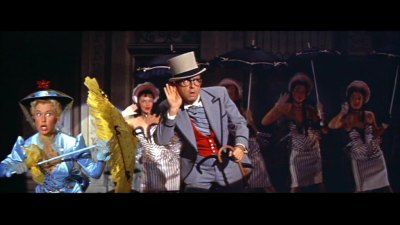
Stranded in Miami Beach, a traveling vaudeville show headed by Hap Schneider (Phil Sivers) and members Candy Williams (Doris Day), Duke McGee (Eddie Foy, Jr.), and Flo (Nancy Walker) are broke and on their heels. While waiting for the bus to take them out of town, Hap arranges with a cop who enjoyed their act, to pull a fast one at a fancy restaurant hotel. After enjoying an expensive meal, Hap and the gang expect to be arrested by the sympathetic cop. Unfortunately, that officer goes off duty, and soon the troupe is washing dishes in the restaurant. After nearly paying off their debt, they accidently break a huge statue outside the hotel (in a fancy dance number), and they find themselves right back at work for the hotel.
This is a lucky break for the gang, though, because Flo meets Dick Carson (Bob Cummings), a famous Broadway producer and songwriter who's mounting his next production. While Hap tries to figure out how they can get Carson's attention, Candy meets Dick under hazardous circumstances (he smashes his car watching her walk down the street), where she eventually comes to believe he's really an auto mechanic. Failing to tell her the truth, Carson has a date with Candy, which backfires when she finds out the truth about his identity. With Hap and the gang tricking Candy into auditioning for Carson, she agrees to star in his show, but trouble arises when the daughter of Carson's "angel," his financial backer for the show, becomes jealous and demands that Candy be thrown off the play. Will Candy and Dick get together, and put on a show?
Opening with the disastrous, interminable musical number Superstition Song, Lucky Me starts off on the wrong foot, and only briefly recovers in fits and starts throughout the running time. A distinctly unmelodic tune, the Superstition Song was a poor choice to open the film, and it's indicative of the poor choices made throughout Lucky Me. Not only is the song poor, the staging, with Doris awkwardly skipping down the Miami streets in her bulky crinoline skirts, borders on parody, and shows Day off in a poor light. When the action moves to the vaudeville theater, with the magnificent Silvers performing Men/Parisian Pretties with Day, Lucky Me gets about as good as it ever will, with the funny, well-acted sequence a credit to Day and especially Silvers. As the film progresses, Silvers is seen less and less, and that's a shame. On the one hand, you can understand that Warner Bros. wanted to make a Doris Day picture, and not a Phil Silvers one. So obviously, they're not going to throw the whole project his way.
But unfortunately, without Silvers expertly timing and mugging, the rest of the film must rely on the questionable chemistry of Bob Cummings and Doris Day. While I've always enjoyed Cummings, he just doesn't fit here in Lucky Me. It doesn't help that his singing voice is dubbed, and he often seems indifferent to the material. Day doesn't look comfortable with him, and so, a romantic musical comedy with two stars who don't work well together is going to sink. Only Silvers last-minute save, impersonating a loud-mouthed Texas oilman at a swank party, keeps the film from a being a total bust. According to Day's autobiography, she suffered from debilitating anxiety attacks prior to, and during the filming, to the point that she suffered what she described as a nervous breakdown. It's not surprising, then, that Doris seems substantially off her game here in Lucky Me, nor is it surprising that the audience sensed something was lacking in this ill-conceived widescreen musical.
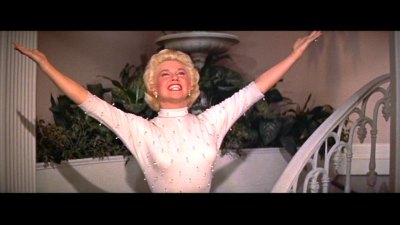
The DVD:
The Video:
Looking fairly spectacular in this letterboxed, anamorphic 2.35:1 scope transfer, Lucky Me is bright, clear, and free of any (at least that I could tell) of those notorious "CinemaScope mumps" that plagued earlier films in that process.
The Audio:
A nice surprise, the Dolby Digital English Surround 5.1 stereo track for Lucky Me sounds amazing. Too bad all of the soundtracks in this set couldn't have been remastered this way.
The Extras:
Included on this disc is the short subject When the Talkies Were Young, a 1955 short subject directed by the celebrated Robert Youngson that features clips from early films with stars like Bette Davis, Clark Gable and John Barrymore. The Oscar-nominated Looney Tunes cartoon Sandy Claws, starring Tweety and Sylvester, is included, as well as the theatrical trailer for Lucky Me.
Final Thoughts:
Watch it for the genius of Phil Silvers, and for his fun first number with Doris Day, but the rest of Lucky Me is decidedly unlucky when it comes to a believable script, memorable tunes, and star chemistry. It's in the set, so you'll probably watch it - once.
Final Thoughts on the Box Set:
With a wealth of extras included on this six film, six disc box set (I like the touch of having the films' original poster artwork on the slimcases), I highly recommend The Doris Day Collection: Volume 2; it's an unique opportunity to watch one of the 20th century's most influential music and film artists start her amazing career.
Paul Mavis is an internationally published film and television historian, a member of the Online Film Critics Society, and the author of The Espionage Filmography.


|
| Popular Reviews |
| Sponsored Links |
|
|
| Sponsored Links |
|
|
| Release List | Reviews | Shop | Newsletter | Forum | DVD Giveaways | Blu-Ray | Advertise |
|
Copyright 2024 DVDTalk.com All Rights Reserved. Legal Info, Privacy Policy, Terms of Use,
Manage Preferences,
Your Privacy Choices | |||||||









